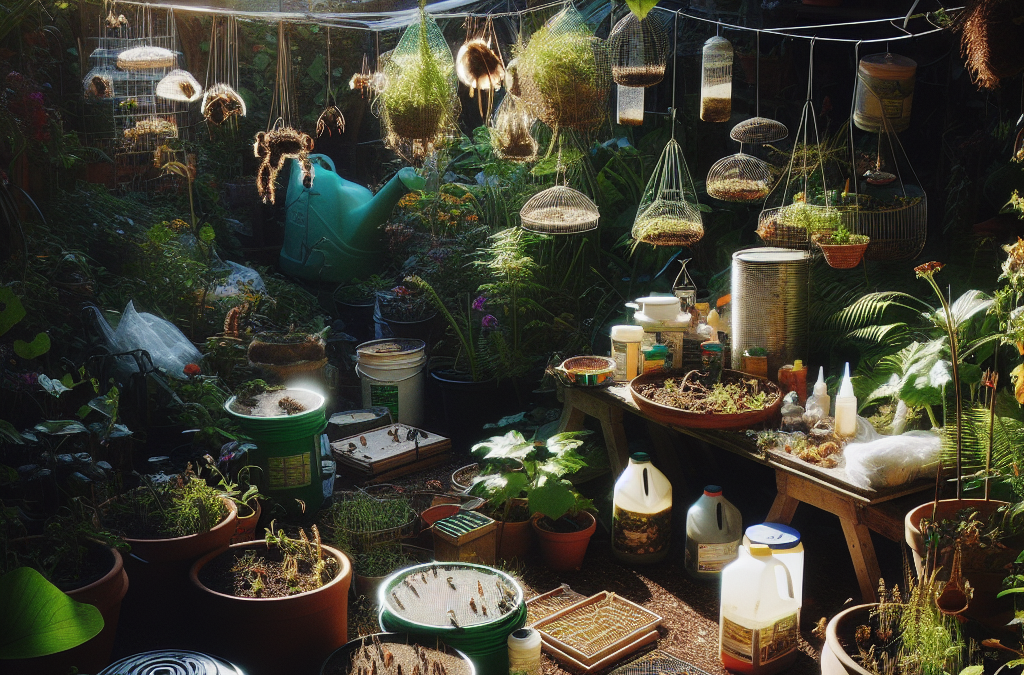Understanding the Importance of Organic Pest Control
Why Go Organic?
Hey there! So, let’s talk about why opting for organic pest control is super critical for those of us who love to garden. First off, chemical pesticides can be damaging, not just to pests but also to beneficial insects, our beloved pets, and even our family. Going organic minimizes these risks significantly. Not to mention, it’s just better for the environment.
When I made the switch, the change was noticeable not only in the health of my garden but also in my peace of mind. Knowing that I wasn’t contributing to chemical runoff or endangering local wildlife felt pretty great. Plus, healthy plants mean a more vibrant garden, which is definitely something I can get behind!
Plus, who doesn’t love the idea of using materials straight out of their kitchen or backyard? It’s like nature’s little hack to keep your greens healthy and happy without bringing in the nasty stuff. Trust me, once you try it, you’ll see why so many of us are all in for organic methods!
Common Pests in Home Gardens
Identifying the Usual Suspects
Okay, so now that we understand the ‘why,’ let’s dive into understanding who the culprits are. You’d be surprised at the variety of pests that might just pop up in your garden. Aphids, for example, are like those annoying houseguests who never leave—they suck the juices right out of your plants!
Then you’ve got your classic gnarly nemeses like spider mites and whiteflies. These little guys can do some serious damage if you don’t catch them early. Often, a good look at your plants can reveal the signs, like webbing or yellowing leaves. We gardeners must play detective sometimes!
Each pest comes with its own issues and remedies, which is why it’s crucial to know what you’re dealing with. Understanding their life cycle and when they’re most active can be the key to effective control. The sooner you spot them, the better your chances at keeping them at bay!
Organic Pest Control Methods
Natural Repellents
One of my absolute favorite methods for keeping pests at bay is using natural repellents. Things like neem oil are a gardener’s best friend. A little spray here and there, and you’ve got yourself a barrier against those intrusive pests.
Another option that always amazes me are essential oils! For instance, peppermint or citrus oils mixed with water can drive away those pesky critters, plus they smell amazing. Just be sure to use a spray bottle that allows a fine mist to ensure even coverage without drowning your plants.
And let me tell you, companion planting is a game-changer. Some plants naturally repel pests when grown alongside others. Marigolds are known for warding off aphids, making them not just pretty but pretty functional too!
Encouraging Beneficial Insects
The Good Bugs
Finding allies in the garden is vital! I absolutely adore the beneficial insects like ladybugs and lacewings. They’re like little superheroes that chow down on aphids and other garden pests. It’s all about finding a balance in the ecosystem of your garden.
To attract these good bugs, I’ve planted various flowers and herbs, too. Ladybugs love nectar, so the more diverse your flowers, the better! Plus, you get a beautiful garden in the process.
Building a small insect hotel can also be a friendly reminder to those good bugs to hang around. Just some hollow sticks, a bit of straw, and voilà—a cozy spot for bees and ladybugs alike!
Monitoring and Maintenance
Regular Check-ins
I can’t stress how important it is to keep an eye on your plants. A weekly or bi-weekly check can save so much hassle later on! Early detection of any problems can really make all the difference in your garden’s health.
Make it a habit to inspect the undersides of leaves; this is where many pests love to hide. I’ve found that after a nice rain or watering, it’s the perfect time to look for any unusual visitors. Just getting down and personal with your plants can give you the scoop you need!
And don’t forget about your soil—it’s truly the foundation of your garden. Keeping it healthy means fewer pests and diseases since a robust plant is better able to fend off invaders. Regularly adding organic compost can really boost soil health!
FAQ Section
1. What are the benefits of using organic pest control?
Using organic pest control is eco-friendly and minimizes the risks to beneficial insects, pets, and humans. It often leads to healthier plants and a more balanced ecosystem in your garden.
2. How can I identify pests in my garden?
Look for signs like discoloration, holes in leaves, or the insects themselves. Regular checks on your plants can help spot problems early!
3. Are there any natural repellents I can make at home?
Absolutely! Mixtures of neem oil, soap water, or even essential oils can be effective. Just remember to test on a small area first!
4. How do I attract beneficial insects?
Plant a variety of flowers and herbs, like marigolds and dill, to attract good bugs. Creating insect hotels is also a fun project that encourages them to settle in your garden.
5. How often should I check my garden for pests?
I recommend checking your plants weekly or bi-weekly. It’s best to catch any issues early before they escalate!





